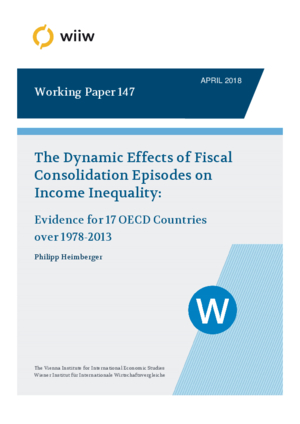The Dynamic Effects of Fiscal Consolidation Episodes on Income Inequality
wiiw Working Paper No. 147, April 2018
29 pages including 2 Tables and 9 Figures
Evidence for 17 OECD Countries over 1978-2013
Using an annual data set covering 17 OECD countries over the time period 1978-2013, this paper analyses the dynamic effects of fiscal consolidation episodes on income inequality in the short and medium run. By estimating impulse response functions from local projections, we find that fiscal consolidations typically lead to an increase in income inequality. Baseline results suggest that in the aftermath of the start of a fiscal adjustment episode, the Gini coefficient of disposable income increases by about 0.4 percentage points in the short run (in year three), and by 0.6 percentage points in the medium run (in year seven). The impact of fiscal austerity measures on the income distribution is found to be more pronounced a) when the size of the fiscal consolidation package is large rather than small; b) when the duration of the adjustment is long instead of short; c) when the fiscal consolidation is based more on spending cuts than on tax increases; d) when the consolidation is started in the aftermath of a financial crisis rather than in a non-crisis episode; and e) when the adjustment falls into a period of low economic growth instead of high growth.
Keywords: income inequality, income distribution, austerity, fiscal policy, fiscal consolidation
JEL classification: D63, E62, E64
Countries covered: Australia, Austria, Belgium, Canada, Denmark, Finland, France, Germany, Ireland, Italy, Japan, Netherlands, Portugal, Spain, Sweden, United Kingdom, USA
Research Areas: Macroeconomic Analysis and Policy
